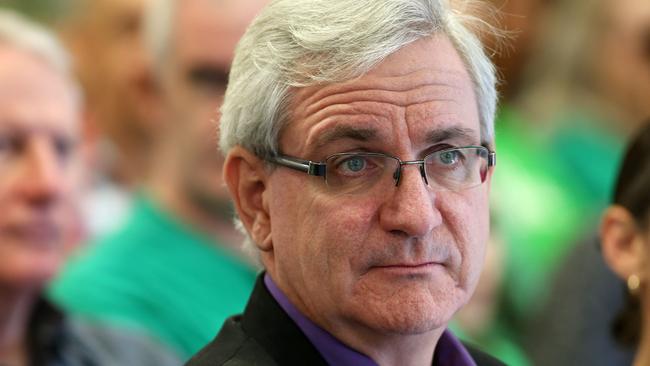Greens replacement Andrew Bartlett in doubt
Andrew Bartlett, the man tipped to replace former Greens MP Larissa Waters, could have his election immediately tested.

Andrew Bartlett, the man tipped to replace former Greens senator Larissa Waters, could have his election “immediately tested” if he wins a special recount and become the party’s third senator this year to lose their seat for sloppiness.
The revelation may cause yet more headaches for the Greens and comes as leader Richard Di Natale and Tasmanian senator Nick McKim await documents proving they renounced their dual citizenship after Ms Waters and Scott Ludlam, the party’s co-deputy leaders, were forced to resign for failing to conduct proper checks.
But some sense of certainty over the party’s future has emerged after Jordon Steele-John, a disability advocate and the No 3 WA Greens candidate most likely to take Mr Ludlam’s seat, confirmed he will fill the vacancy left by his friend and mentor.
At 22 years of age, Mr Steele-John would make history by becoming the youngest ever senator.
“After that careful internal reflection — which is appropriate for a significant decision like this — I have firmly resolved that I want to do this job. I’m capable and ready to do this job,” he told Fairfax Media.
The Greens have also undertaken a mini and temporary reshuffle, with Adam Bandt, the member for Melbourne, and WA senator Rachel Siewert to fill the co-deputy leadership positions “on an interim basis” until a ballot of the full partyroom is held.
Mr Bartlett, a former Democrats leader, was a researcher at the Australian National University’s College of Law at the time he nominated to be a Queensland Greens candidate.
Constitutional lawyer George Williams, who has advised political candidates for 20 years in this space, said Mr Bartlett “runs the risk of being challenged” because he held a paid position with a government-funded institution.
Under section 44 of the Constitution, the same section that implicated Ms Waters and Mr Ludlam, a person who holds “any office of profit under the Crown” can be disqualified.
However Professor Williams conceded it remained a “grey area” as a politician employed by a university had never had their election challenged in the High Court.
“It could be we get a senator whose eligibility is immediately tested,” Professor Williams said.
“There’s no doubt there’s a risk and the question will be what the Senate does about it or whether someone else seeks to do something about it.”
Anne Twomey, also a constitutional lawyer, said if she ever ran for parliament — “and never would” — she would resign from the university before nominating.
Mr Bartlett has hit back at suggestions he may be incapable of being chosen for the Senate, saying it was “not correct” to assert a university position was an office of profit (a paid government position).
“We’ve had strong advice to the contrary for some years and people have been elected to parliament previously without resigning their university position,” he said.
The document he is relying on, from the National Tertiary Education Union, says the union is unable to give “any absolutely definitive advice” as the specific issue has never been the subject of judicial consideration.
“Having said that, the fairly overwhelming weight of opinion is that university staff do not hold an office of profit under the Crown, as universities are not ‘the crown’, and that therefore university staff are not precluded from seeking election,” the NTEU says.
Phil Cleary, an independent who was elected to the lower house seat of Wills in 1992, was disqualified from parliament for being a Victorian schoolteacher despite being on leave without pay at the time.
Professor Williams said it was unclear if people who worked for entities with a government connection, like universities or the ABC, could also be kicked out.
“It’s arguable they’d be disqualified, it’s arguable they would not be. There’s great uncertainty about this. I’ve been wondering for many years whether someone would bring a challenge,” he said.
It is understood Labor MPs Anne Aly and Andrew Leigh resigned from their positions with Edith Cowan University and the ANU before nominating to run for federal parliament.
The Greens have been plunged into turmoil following the shock resignations of Ms Waters (of Queensland) and Mr Ludlam (of Western Australia), who discovered they were citizens of Canada and New Zealand and therefore ineligible to have ever been elected.
Their resignations followed what Senator Di Natale has described as a “terrible month” for the party, after a civil war broke out over the conduct of NSW senator Lee Rhiannon and her branch’s practice of binding its MPs on policy.
Senate president Stephen Parry has notified the governors of WA and Queensland of the vacancies caused by the Greens’ resignations.
He will also inform the Senate as first order of business when parliament returns on August 8, and the upper house is then expected to refer their elections to the High Court.
The government has granted pairs for the two Greens MPs, meaning there will still effectively be 76 votes in the Senate.
It could take months for the court to determine how the seats should be filled, but it is likely recounts will be ordered and the Greens’ next eligible candidates — Mr Bartlett and Mr Steele-John — be declared the winners.
Next in line on the Qld Greens ticket after Mr Bartlett is Ben Pennings.




